The Savannah cat is a hybrid cat breed that is a cross between the African serval and a domestic cat. The Savannah was named after the habitat of the serval, and their beauty echoes the lush splendor of those golden plains in Africa. Much like their wild cousin, the Savannah cat is tall and lean with long legs, big ears, and a spotted coat.
Learn more about living with this highly active and intelligent cat breed, including if they are legal to own in the United States.
Breed Overview
Personality: Affectionate and social with owners, pets, and older children; intelligent and trainable
Weight: 12 to 25 pounds (depending on the generation)
Length: 20 to 22 inches (depending on the generation)
Coat Length: Short to medium hair
Coat Color: Tawny, black/brown spotted tabby, black/silver spotted tabby, or black smoke with a solid or tabby pattern
Coat Patterns: Spotted, striped, or solid
Eye Color: Amber or green
Lifespan: Up to 20 years
Hypoallergenic: No
Origin: Africa (serval), varied locations (domestic cat)
Savannah Cat Characteristics
The Savannah cat makes an excellent companion in the right home. They're sociable with people and pets, highly intelligent, and always willing to greet their owners with friendly head bumps. A Savannah cat may follow their owner around the house like a dog and are often described as "Velcro cats." They aren't the type of cat to sleep all day and cuddle on your lap; they need a home that will give them plenty of exercise and playtime.
Savannahs generally get along well with other cats and dogs, and they're good with older children (toddlers may be easily overwhelmed by these large, playful cats). When buying a Savannah cat, choose a breeder who has socialized the kittens in a home with pets and kids so that they are not shy or fearful of these interactions.
| Affection Level | High |
| Friendliness | High |
| Kid-Friendly | High |
| Pet-Friendly | High |
| Exercise Needs | High |
| Playfulness | High |
| Energy Level | High |
| Intelligence | High |
| Tendency to Vocalize | Medium |
| Amount of Shedding | Medium |
History of the Savannah Cat
The first known Savannah cat was born in 1986, and fittingly, the kitten and the breed were called Savannah. The cat seemed to have the perfect combination of wild and domestic traits from the parents.
In the early 1990s, Patrick Kelley, founder of Savannahcat.com, heard about the breed and enlisted the help of Joyce Sroufe, founder of A1Savannahs, to help him develop the Savannah breed into what we know today. Thanks to their efforts, The International Cat Association recognized the Savannah as a breed in 2001.
Savannah Cat Care
Savannah cats are not for the faint of heart and require much more exercise and attention than the typical house cat. They can even be clicker- and leash-trained.
Exercise
Savannah cats' long legs and athletic grace lend themselves to leaping, and these cats love landing on high surfaces. Provide a tall cat tree or other safe climbing opportunities. Of course, you must also expect your Savannah to spy high places—cabinet tops, shelves, refrigerators—and attempt to scale them as well. It's a quirk that many owners learn to love; just make sure there are no breakable items in your cat's way.
Like servals, many Savannahs love to play in the water. Fill a kiddie pool and let your cat explore the water at their own pace (don't plunk the cat into the pool). An enclosure around the pool can allow outdoor fun without the risk of escape. Just make sure to provide shade on hot summer days. You might even find them curiously exploring the bathtub or shower.
In addition, Savannah cats will often accept wearing a harness and accompanying their owners on outdoor walks. Provide appropriate outlets for scratching to save your furniture, like scratching posts.
Grooming
The Savannah cat has a short coat that is easy to care for. You can brush your cat weekly to help keep hairballs at bay, and trim your cat's nails as often as needed to dull their sharp tips for indoor living. Brush your cat's teeth frequently and get appropriate veterinary cleanings.
Training
Savannah cats have been called dog-like in their love of playing fetch and their ability to be trained. You can clicker-train them as you would a dog to do tricks and obey commands.
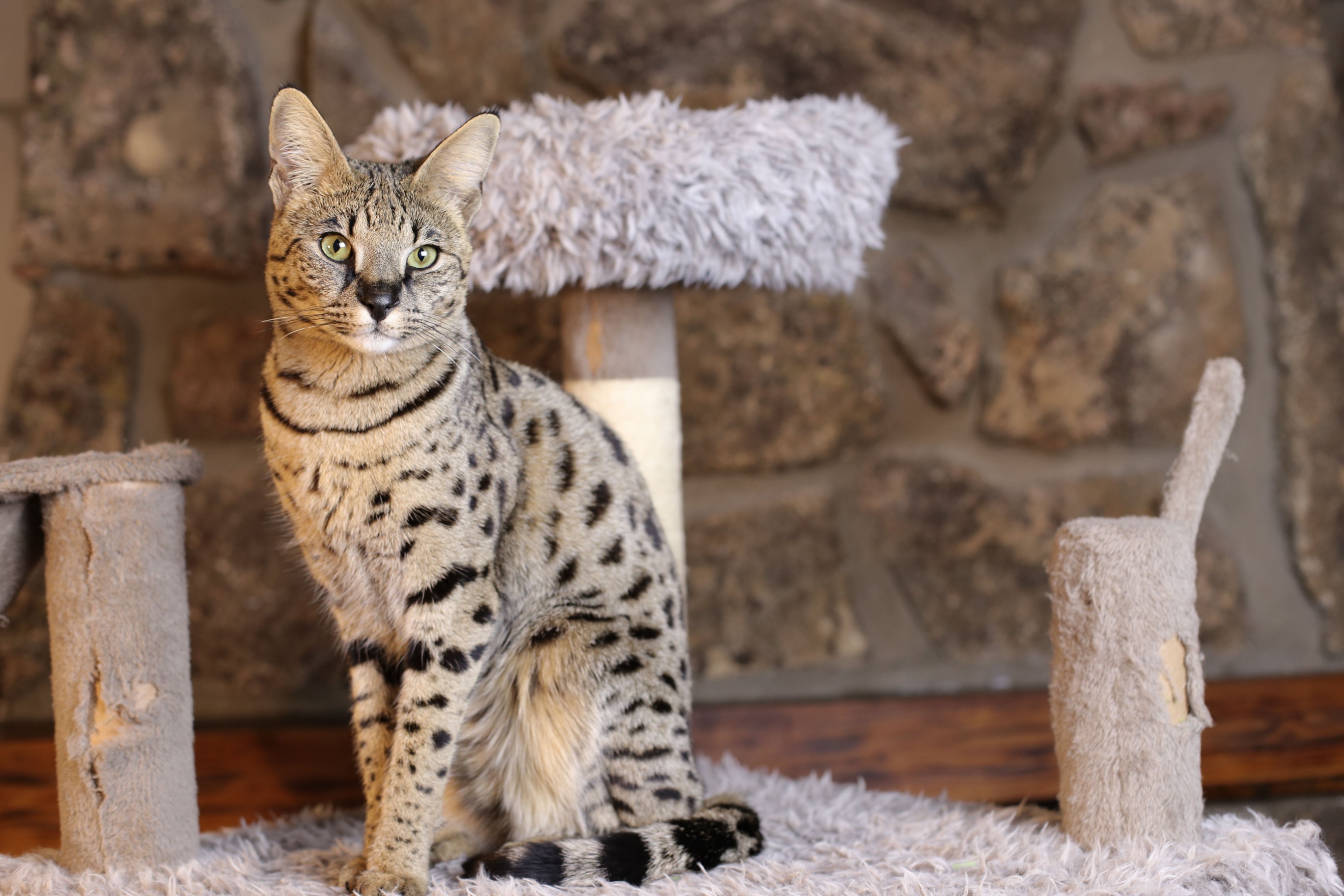
ajr_images / Getty Images
Common Health Problems
Savannah cats are generally healthy and should be given the same veterinary preventative care visits and treatments as other domestic cats. However, they are more prone to hypertrophic cardiomyopathy than fully domestic cats. This heart condition causes thickening of the heart's left ventricle, which can lead to heart failure.
Also, hybrid male sterility is to be expected until the F4 generation.
Appearance
The Savannah cat is tall and lean with long legs and a long neck (its parent breed, the serval, is sometimes called the "giraffe cat" because of these characteristics). Their large ears sit high atop their heads and are more rounded than most domestic cats' ears.
The Savannah's coat ranges in color from light tawny to smoky black and bears a characteristic black spotted pattern with occasional bars. Occasionally, a Savannah cat may be solid black, lacking spots.
Diet and Nutrition
Savannah cats have the same nutritional requirements as domestic cats. Some experts recommend a combination of commercial dry food or wet food and raw or cooked meat. Some experts feel the breed needs more taurine and may recommend a taurine supplement. Provide access to fresh, clean water at all times.
Talk to your vet for nutritional guidance for your specific cat, and track their food intake and weight to prevent obesity and other health problems.
Where to Adopt or Buy a Savannah Cat
You may be able to find a purebred savannah cat through a breeder, but these cats are a rare find. If you would rather adopt from a rescue organization, check out the Savannah Cat Rescue.
Types of Savannah Cat
The types of savannah cat are expressed in terms of filial generation (i.e. the number of generations a cat is from the serval in its lineage), including designations from F1 through F8.
- An F1 Savannah cat has one serval parent and one domestic cat parent, so it is 50% serval. These cats are the largest and least affectionate of the Savannahs because they are closer to wild animals than later generations. They weigh up to 25 pounds and stand about 16 to 18 inches at their shoulders. They are the least suitable for households with small pets or kids and are the most expensive to purchase (up to $20,000).
- An F2 Savannah has a serval grandparent. It is similar in size and temperament to an F1, but it will tend to be slightly more affectionate and less wary of new interactions. They are more suitable for family life and cost significantly less (ranging up to $11,000).
- An F3 cat has a serval great-grandparent. It weighs up to 20 pounds and is about 17 inches in height. They still look wild, but their personalities are tamer and even more affectionate than F2s.
- An F4 Savannah cat's size and temperament are said to be more predictable. At that level, at least one great-great-grandparent was a serval.
A Stud Book Traditional Savannah cat is at least four generations removed from the serval but has only Savannah cat parents for at least three generations, without further outbreeding with domestic cats.
A male is not fertile usually until the sixth generation from the serval parent. The females are usually fertile from the first generation.
Savannah Cat Overview
The Savannah cat is a fantastic family pet with wild appeal. Not only are they beautiful and striking animals but are also large, playful, and enjoy interacting with kids and other pets. Unfortunately, Savannah cats are not easily acquired; their breeders are few and far between, and the cats are very expensive. In addition, state laws may ban them or require permits for ownership.
Pros of the Savannah Cat
- Affectionate and social with pets and children
- Highly intelligent and trainable
- Extremely loyal to their owners
Cons of the Savannah Cat
- Relatively rare and expensive
- Prone to heart disease
- Banned in some states
- Not a good fit for first-time owners or those looking for a lazy cat
More Cat Breeds and Further Research
If you’re interested in similar breeds, check out:
- Ocicat
- Toyger
- Egyptian Mau
Otherwise, check out all of our other cat breed profiles.
- How much does a Savannah cat cost?
The cost of Savannah cats can range from $5,000 to $20,000. F1 generation cats are the most expensive.
Are Savannah cats good house pets?Savannah cats are playful, intelligent, and active, so they can be challenging house pets that require patient, loving owners.
Are Savannah cats legal to own?Savannah cats are illegal to own in Georgia, Hawaii, Nebraska, and Rhode Island and cannot be legally owned without a permit in many locations. Look up your local laws before bringing a Savannah cat into your home.
Related Article
 cat-basic-training
cat-basic-training7 Times Your Cat Acts Exactly Like a Baby
If you’re like most pet parents, your cat has probably become a member of your family. And, hopef
 cat-behavior-problems
cat-behavior-problemsHow to Keep Your Cat Off the Kitchen Counters
Keeping your cat off the kitchen counters isn't just a way to prevent spills—it could also he
 cat-nutrition-and-food
cat-nutrition-and-foodWhat Cat Food Ingredients Should I Look For?
As a general rule, the order of ingredients is just as important as the kind of ingredients. Unless
 cat-parasites
cat-parasitesCan Indoor Cats Get Fleas?
You may be surprised to learn that indoor cats can and do get fleas. While indoor cats may be less
 cat-preventative-care
cat-preventative-careHow Much Exercise Do Cats Need? Here's What To Know
Yes, cats need exercise, too. As with humans, a sedentary lifestyle can lead to negative effects on
 cat-symptoms
cat-symptomsCat Can't Pee? Here's What to Do
If your cat is not peeing, they might have a medical problem. Cats may have difficulty peeing when
 cat-diseases-and-disorders
cat-diseases-and-disordersAnemia in Cats
Anemia is not a disease on its own, but rather, is a sign that there is an underlying health proble
 long-haired-cat-breeds
long-haired-cat-breedsNorwegian Forest Cat: Breed Profile, Characteristics & Care
The Norwegian forest cat possesses a long, dense coat that helped their ancestors survive for centu
About FleaFree Feline
We are a premier digital platform committed to delivering high-quality content to our readers. Our mission is to provide accurate, reliable, and engaging information that adds value to our audience's daily lives.
Our team consists of experienced content creators and subject matter experts who uphold the highest standards of professionalism. In an era of information overload, we curate content with care, ensuring our users receive only the most relevant and trustworthy information.
Beyond just reporting facts, we focus on depth and context. Through expert analysis, comprehensive research, and clear presentation, we help our audience gain meaningful insights and make informed decisions.
We take pride in being a trusted information source for our growing community of readers. Our user-first approach means we continuously adapt to provide content that meets our audience's evolving needs and interests.
Innovation and excellence drive everything we do. We're committed to improving our platform and services to deliver the best possible experience for our users.

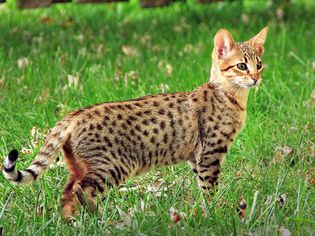
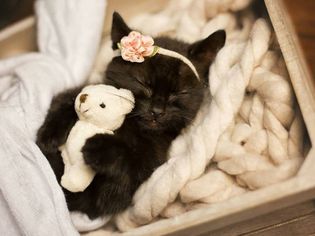
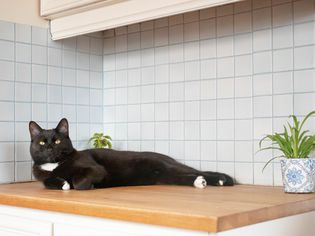
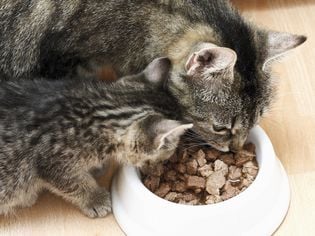
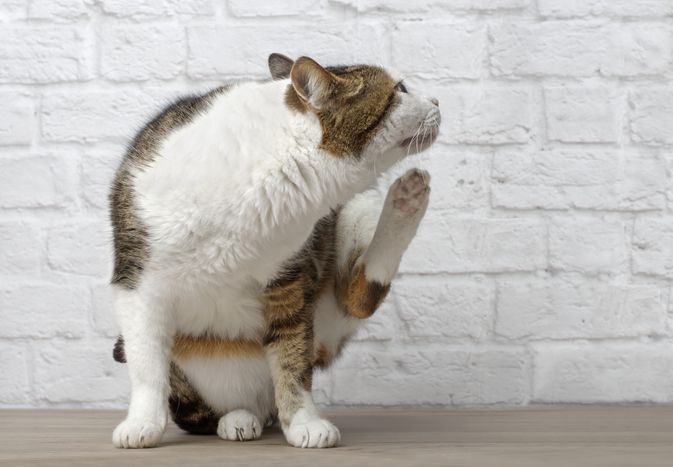
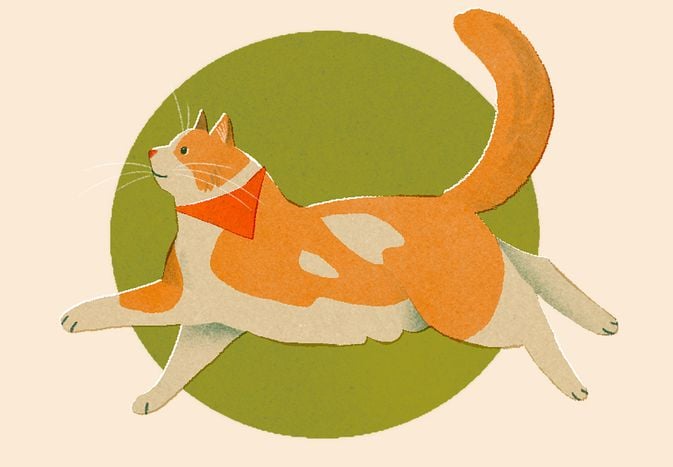
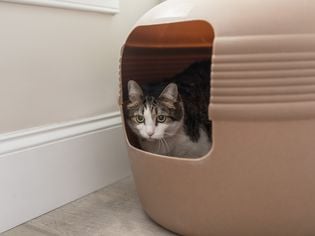
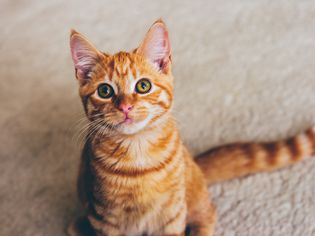
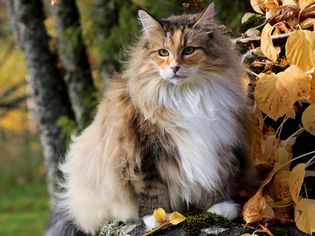
Comments on " Savannah Cat: Breed Profile, Characteristics & Care" :